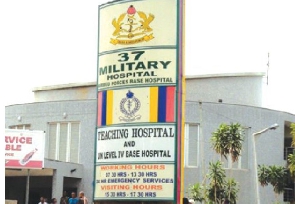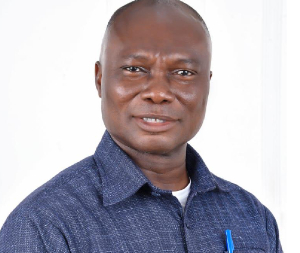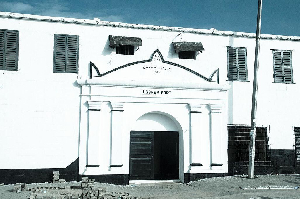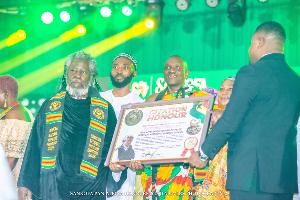The Chief of Defence Staff, (CDS) and the 37 Military Hospital have been ordered by the High Court in Accra to release an investigation report conducted on the circumstances leading to the death of a 48-year-old man, Solomon Asare – Kumah to his family.
This was after the family of Solomon Asare-Kumah, the deceased had sued the Hospital together with a doctor COL/Dr. G. A. O. APPIAH, the CDS, and Attorney General demanding GHc2 million damages for medical negligence leading to his death.
The family of the deceased contends that the death of their relative at the hospital in October 2019 was due to a breach of contract and negligence by the hospital and the doctor, Col. Dr Gao Appiah who took care of him.
The family had petitioned the CDS for enquiry into the circumstances of their relative’s death but after the investigation, the report was not given to them.
After suing the hospital for damages in the sum of GHc2 million and pending the determination of the substantive matter, the family through Emmanuel Asare-Kumasi, on October 21, 2022, filed an application for an order for Discovery.
The plaintiff sought for; “an order directed at the 2nd Defendant (CDS) to furnish plaintiff with the final Report of the Board of Inquiry held in respect of the death of Solomon Asare-Kumah and allegations of extortion against the 4th Defendant.”
Secondly, “an order directed at the 3rd Defendant to furnish Plaintiff with the full and complete medical record of Solomon Asare-Kumah (deceased).
But responding to the application in an affidavit to the request deposed to by Justice Oteng, a Legal Officer at the Department of Legal Services, Ghana Armed Forces, General Headquarters, on the authority of the 1st to 3rd Defendants/Respondents opposed to the request and said the report is exclusively for internal use.
“..The 2nd Respondent is vehemently opposed to the request by the Applicant for the Report/Record of the Board of inquiry,” the affidavit in opposition stated.
It contends that, “the Report of the Board of inquiry is a restricted document meant for the exclusive internal use of the Ghana Armed Forces.”
The High Court in Accra presided over Justice Charles Ekow Baiden, a Justice of the Court of Appeal sitting as an additional High Court judge while ruling on the application for an order for recovery on June 2, 2023 order the CDS and the hospital to release the report to the family within 10.
“The report or record of proceedings of the Board of Inquiry relating to the admission, treatment and death of the Deceased, howsoever described by the 1st to 3rd Defendant/Respondents, together with the medical records of the Deceased shall be furnished to the Plaintiff/Applicant within ten (10) days hereof,” the Court ruled.
The 10 days is expected to elapse on Monday, June 12, 2023.
Ruling
The concluding part of Justice Charles Ekow Baiden reads as follows;
I take judicial notice and it is so proven that on or around January 2023 a summary report of Board of Inquiry into the alleged missing baby at the 3rd Defendant/Respondent hospital maternity unit, which Board of Inquiry was convened by the 3rd Defendant/Respondent was disclosed to an aggrieved couple in that matter.
In so doing, I am minded that judicial notice can be taken of facts which are so capable of accurate and ready determination by resort to sources whose accuracy cannot reasonably be questioned, as provided for pursuant to Section 9(1) of NRCD 323. According to Brobbey JSC., (as he then was), the learned author of ESSENTIALS OF THE GHANA LAW OF EVIDENCE, “I…J judicial notice is not just aform foevidence. It si aform of proof.” (Emphasis added).
After lengthy experiments with militaryregimes, we thepeople of Ghana began a new path towards constitutional supremacy in 1992.
The 1992 Constitution we adopted for ourselves embodied principles of accountability and the protection and preservation of fundamental human rights and freedoms.
To achieve these solemn goals, the 1992 Constitution vested final judicial power in the Judiciary. Article 125(3) of the 1992 constitution provides that: “The judicial power of Ghana shall be vested in the Judiciary, accordingly, neither the President nor Parliament nor any organ or agency of the President or Parliament shall have or be give final judicialpower.” (Emphasis added).
In furtherance of this, Article 140(1) of the 1992 Constitution vested the High Court with jurisdiction in all matters and in particular, in civil and criminal matters and such original, appellate and other jurisdiction as conferred by the Constitution or any other law. The combined effect of Articles 33(1) and 140(2) of the 1992 Constitution is that this Court has the responsibility to protect and preserve the natural and inalienable rights fundamental to the well-being of al persons.
Article 12(1) of the 1992 Constitution provides that:”The fundamental human rights and freedoms enshrined ni this Chapter shall be respected and upheld by the Executive, Legislature and the Judiciary and allother organs of government and its agencies and,where applicable by all natural and legal persons in Ghana, and shall be enforceable by the Courts as provided for ni this Constitution.” (Emphasis added).
I am of the humble view that the principles of accountability enshrined in the Preamble, Articles 23 and 296 of the 1992 Constitution frowns upon unbridled exercise of such wide discretionary power contained in Article 21.17.1 of AFR (Volume 1) C.I 12 which purports to oust the jurisdiction of the court.
Even if, the 1st to 3rd Defendants/Respondents have the discretion to not disclose a Board of Inquiry Report to the Plaintiff/ Applicant, such discretion must be exercised fairly, reasonably and not arbitrarily or in a biased manner.
Indeed, Article 17 of the 1992 Constitutions abhors discrimination against persons such as the Plaintiff/Applicant herein. Article 17(3) provides that: “For the purposes of this article, “discriminate” means to give different treatment to different versons attributable only or mainly to their respective descriptions by race, place of origin, political opinions, colour, gender, occupation, religion or creed, whereby persons of one description are subiected to disabilities or restrictions to which persons of another description are not made subject or are granted privileges ordisadvantages which are not granted to persons of another description.”
It has not been demonstrated to this Court that there is reasonable justification for treating the Plaintiff/Applicant differently from the manner the couple in Exhibit “D’ and “E” has been treated.
I find that the Plaintiff/Applicant alleges negligence in tort, breach of contract, misrepresentation and undue influence.
The Defendants/Respondents have denied the existence of a contract. If so, the Defendants/Respondents must be made to subiect this dispute to the ordinary rules of negligence in tort, contract and the remedies available to a party who alleges violation.
In so far as the Defendants/Respondents engage in commercial transactions, they must necessarily abide by the rules of engagement including good faith obligationsand the duty of care, among others.
The 1st to 3rd Defendants/Respondents ought not to be allowed to seek refuge elsewhere.
For all the above reasons, I am of the firm view that the Plaintiff/Applicant has shown reasonable cause for this Court to grant the order prayed for as the report relating to the death of the Deceased is necessary to fairly dispose of the matter, pursuant to the overriding objective of Order 1rule 2of C.I. 47.
The report or record of proceedings of the Board of Inquiry relating to the admission, treatment and death of the Deceased, howsoever described by the Is to 3rd Defendant/Respondents, together with the medical records of the Deceased shall be furnished to the Plaintiff/Applicant within ten (10) days hereof.
Subject matter
The family contends that, “the hospital and its employees fail to exercise due care when they wrongly inserted Solomon’s breathing tube under his skin thereby denying oxygen for a considerable amount of time and as such causing stain on his heart and other organs and thus causing his death.”
The family argues that they, therefore, requested for a refund and for an administrative enquiry into these claims as well as the allegations of breach of contract and negligence, but the 3rd defendant refused to accede to the demand for investigations.
“A petition was therefore lodged with the Medical and Dental Council which took up the matter with the Military Command.
“Plaintiff avers that the Military Command subsequently commissioned a Board of Inquiry to look into the petition. The
family was invited to give testimony as part of proceedings held by the Military Command and it did. This was in March 2020.
“Unfortunately, the Military Command, just like the 3rd defendant has failed and or refused to communicate its findings or make available its report to the family, in spite of several demands by the family and plaintiff’s lawyer.
Plaintiff states that indeed, the 2nd defendant’s office has failed to respond to plaintiff lawyer’s letter requesting for a copy of the report on behalf of the grieving family.
The office simply ignored the letter
When officers from the lawyer’s office subsequently followed up, they were informed that the office would get back to the family, but that had not happened as at the time the plaintiff’s lawyers served a noticeof plaintiff’s intention to sue.
The Plaintiff avers that the particulars of undue influence and misrepresentation are:
Page 13 of 17
a. The relationship between 4th defendant (the consultant surgeon assigned by the 3rd defendant to Solomon’s case) on the one hand, and Solomon and the family on the other hand, was that of a superior and an inferior relationship (ie doctor-patient);
b. 4th Defendant knew that the family trusted him as a consultant surgeon and a Senior Military Officer and would rely on his statements;
c. The family relied on 4th defendant’s statements and paid to him the sum of thirty-six thousand two hundred Ghana Cedis (GHC36,200.00) for the purchase of the alleged surgical supplies and for his services;
d. 4th Defendant took advantage ofhis position as a consultant surgeon and a highly ranked member of the Military to
extort the sum of thirty-six thousand two hundred Ghana Cedis (GH&36,200.00) by making false representation to Solomon’s family that he required the money to purchase surgical supplies, and for his services when he knew these
representations were false;
e. 4th defendant knew that Solomon’s family was vulnerable at the material time that he (reviewed his alleged fees for surgery by an additional US$2000.00.
Report is exclusively for internal use
In an affidavit to the request deposed to by Justice Oteng, a Legal Officer at the Department of Legal Services, Ghana Armed Forces, General Headquarters, on the authority of the Ist to 3rd Defendants/Respondents opposed to the request and said the report is exclusively for internal use.
“..The 2nd Respondent is vehemently opposed to the request by the Applicant for the Report/Record of the Board of inquiry,” the affidavit in opposition stated.
It contends that, “the Report of the Board of inquiry is a restricted document meant for the exclusive internal use of the Ghana Armed Forces.”
It stated that, “the Report of the Board of Inquiry conducted under the auspices of the Ghana Armed Forces is privileged and same cannot be disclosed to the Public even in legal proceedings.
“That per with the Armed Forces Regulations [Administration] Volume 1 (AFR Vol. 1) (C.I 12), applications for the release of record or report of a Board of an Inquiry requires the express instructions of the 2nd Defendant herein.
“That pursuant to the AFR. Vol 1, the 2nd Defendant stated that the Report of the Board of Inquiry as requested by the Applicant is confidential and same cannot be released.
It contends “that the discovery of the Report of the Board of Inquiry as prayed is not necessary for a fair and effectual disposal of the instant action and will rather prejudice the trial.”
It stated further that, “the Applicant has not shown any reasonable cause for the discovery of the report of the Board of Inquiry,” and “that the 3rd Respondent is however not opposed to Plaintiff/Applicant’s request for the disclosure of the medical records ofthe deceased in its custody.”
General News of Saturday, 10 June 2023
Source: starrfm.com.gh













